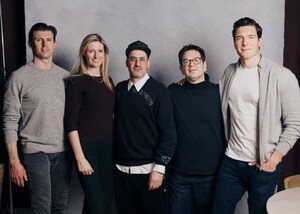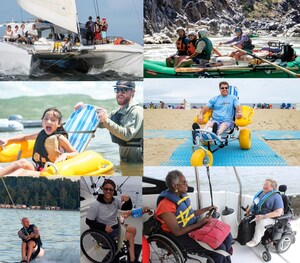Steve Kenny, Peer Mentor, Offers Opportunity to Help 'Shorten the Learning Curve' for the Newly Injured
This article is by Nate Herpich on behalf of the Christopher & Dana Reeve Foundation Paralysis Resource Center (PRC). The PRC is a national resource which provides a road map of complimentary services and programs to empower individuals living with paralysis.
SHORT HILLS, N.J., Dec. 2, 2014 /PRNewswire-USNewswire/ -- On May 23, 1993, Steve Kenny dove into a pool. He hit his head on the pool's floor, injuring his spinal cord at the C5/6 location. The accident resulted in quadriplegia.
A fiercely independent person, Steve immediately found himself to be lost. He couldn't bear to be a burden to his loved ones, and he couldn't imagine a life without his freedom. How could he return to his independent self, and perform the basic tasks that came with it, like living in his own home, shopping, cooking, driving, or being productive at work?
Steve remembers that the answer wasn't exactly written in a textbook. "I had to learn everything the hard way," he says. "I didn't know any other quads when I got hurt, so I did a lot of research on my own. There was a lot of trial and error, and a lot of uncomfortable moments." Dating, sex, and intimacy were particularly hard. "I went on my share of awkward dates. I had to relearn how to approach a woman. How to communicate with people." Steve remembers that he piloted five different ways of managing his bladder until he found out what worked for him.
"I persevered, and I'm at a good place in my life now," he says. "But it didn't happen overnight. If only I had had someone to talk to after my injury, I could have avoided a lot of pain and heartache."
Now, Steve is returning the favor, in a way, to that former self, as Southeast Regional Coordinator of the Christopher & Dana Reeve Foundation's Peer & Family Support Program (PFSP). It's his job to provide others living with paralysis and their caregivers with the opportunity to confide in mentors who may have undergone similar experiences in their own lives.
"Peer mentors can help to shorten the learning curve for the newly injured and their families, and help those individuals to avoid some of the potholes and pitfalls they may have encountered in their own lives," he explains. "And sometimes, they simply provide that reassuring ear that it's possible to still have a rewarding, productive life following a spinal cord injury."
"Steve has a unique talent for making people feel at ease," says Bill Cawley, Program Manager of the PFSP. "He's one of those rare individuals whose very presence and perspective offers a calming influence to those who are going through a difficult time in their lives. We're very lucky to have him as a mentor in our program."
Steve began his career as a mentor seven years or so ago at Brooks Rehabilitation in Jacksonville, Florida, an organization that has provided similar peer mentoring since 2002. As the Reeve Foundation's first partner in the PFSP, Brooks contributed to the training curriculum Reeve uses in its own peer mentor trainings.
Steve also works very closely with another partner in his role as a peer mentor. "After many years on my own, I found the love of my life Catherine Mantz. She recently became a mentor as well, and she shares her experience of what it's like to be in a relationship and live with a quadriplegic." The couple often invites newly paralyzed peers to their home to provide an example of how they too can live a happy, healthy life. It is their hope that by sharing their own experience, they can help others to navigate through the tough times, and show them that things do get better.
"One of the most rewarding aspects of the work I do, is when I meet with someone I mentored years back, and to see how they are flourishing now," says Steve. "In fact, just this past week, I received an invitation to the wedding of someone whom I visited in the hospital shortly after they were injured, three years ago. Our goal for the PFSP is to continue to grow our programs, so that we can have a similar positive effect on more and more people in the future."
The good news is, the program is already blossoming. Founded in 2011 with a grant from the Center for Disease Control, the PFSP now already consists of more than 350 mentors in 37 states across the U.S, serving over 1,000 clients, or "peers." On March 10, Steve will preside over a Peer Mentor training event at the Shepherd Center in Atlanta, Georgia. 24 new mentor applicants are scheduled to attend this class.
Of course, the strength of the program is built on its community of clients, and so, the Reeve Foundation continues to actively recruit new peers today, including, people living with paralysis, family members, and caregivers who are in need of guidance by a certified mentor.
The benefits of doing so for the peer include: gaining a clear understanding of the realities of paralysis and how to maintain a healthy lifestyle, building confidence and motivation, and understanding progress in the field of paralysis research.
"The bottom line is, people living with spinal cord injury can have a good quality of life, even if it's not always easy along the way," says Steve. "And the PFSP is a fantastic resource for helping people along their own unique journeys of discovery."
The Christopher & Dana Reeve Foundation is dedicated to enhancing care and providing critical support to the paralysis community in the here and now. Visit the Paralysis Resource Center at paralysis.org and take advantage of the free resources available.
CONTACT: Angela Cantillon, 1-800-539-7309
Logo - http://photos.prnewswire.com/prnh/20100511/REEVELOGO
To view the original version on PR Newswire, visit:http://www.prnewswire.com/news-releases/steve-kenny-peer-mentor-offers-opportunity-to-help-shorten-the-learning-curve-for-the-newly-injured-300002929.html
SOURCE Christopher & Dana Reeve Foundation
Related Links
http://www.christopherreeve.org
WANT YOUR COMPANY'S NEWS FEATURED ON PRNEWSWIRE.COM?
Newsrooms &
Influencers
Digital Media
Outlets
Journalists
Opted In





Share this article